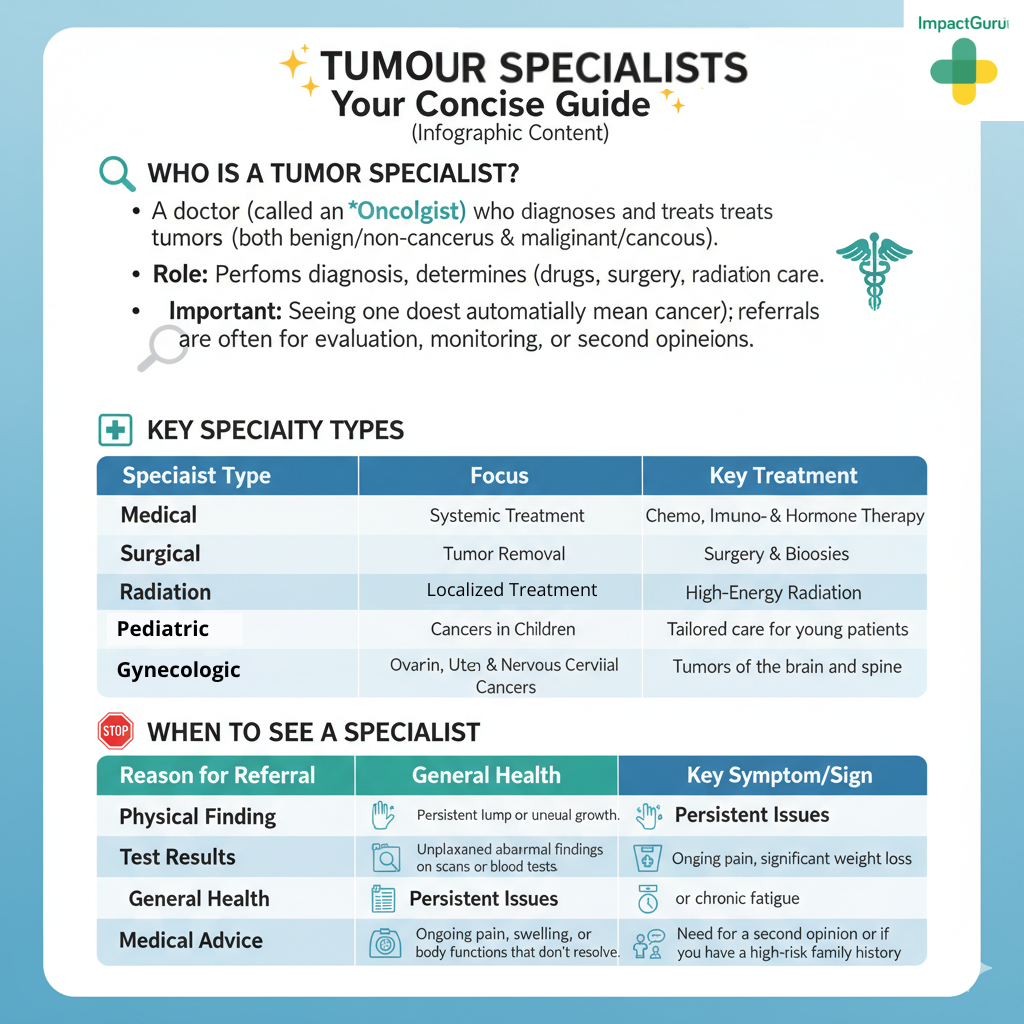Being referred to a tumor specialist can feel overwhelming. The moment your doctor mentions a tumor or schedules an appointment with an oncologist, your mind may start to race — Do I have cancer? Is it serious? What happens next?
But here’s the truth: not everyone who visits an oncologist has cancer. Many patients are referred simply to get a proper diagnosis, seek a second opinion, or rule out serious conditions. Still, the uncertainty can be daunting — especially when emotional stress and financial concerns come into play.
And if the financial side of treatment feels like another burden, platforms like ImpactGuru can help. Through medical crowdfunding, patients can raise funds online to access timely, high-quality care without added financial stress.
Read more: Find Hospitals near you.
Read more: Calculate the Cost of your Treatment.

Table of Contents
Who is a Tumor Specialist?
A tumor specialist is a medical professional who diagnoses, monitors, and treats tumors — whether they are cancerous (malignant) or non-cancerous (benign). In most cases, this specialist is known as an oncologist. People often use terms like tumor doctor, cancer doctor, or oncologist doctor interchangeably — all referring to experts who handle tumor-related diseases and cancer care.
Still wondering who exactly an oncologist is?
An oncologist is more than just a cancer-treating doctor. They are deeply involved from the moment a tumor is suspected — performing diagnostic tests, confirming whether it’s benign or malignant, explaining treatment options, and providing long-term medical and emotional support. They also collaborate with surgeons, radiologists, and pathologists to create a personalized treatment plan suited to each patient’s condition.
It’s also important to remember that not every tumor means cancer. However, any abnormal growth requires evaluation. A tumor specialist determines whether the growth poses a health risk and what steps need to be taken next. Whether it’s a harmless cyst or a serious malignant mass, their goal is to ensure you receive timely and appropriate care for the best possible outcome.
Read More: नाक से खून आना के लक्षण, कारण और इलाज
Types of Oncologists Who Treat Tumors
Cancer and tumor treatment usually involve a team of doctors, not just one. Depending on your diagnosis, you may meet several types of tumor specialists, each focusing on a different part of your care. While all are broadly referred to as oncologists, their expertise varies based on the type of cancer, organ involved, and treatment method.
Below are the main types of oncologists who treat tumors and cancer:
1. Medical Oncologist
A medical oncologist often serves as the primary doctor overseeing your overall cancer treatment. They use medications such as chemotherapy, immunotherapy, hormone therapy, and targeted drugs to destroy cancer cells or control their growth. Many medical oncologists are also trained in hematology, allowing them to treat blood cancers like leukemia, lymphoma, and myeloma.
2. Surgical Oncologist
When a tumor needs to be removed or confirmed via biopsy, a surgical oncologist steps in. They perform tumor removal surgeries and work closely with other specialists to plan pre- and post-operative care. Their role is crucial when cancer is localized and operable.
3. Radiation Oncologist
A radiation oncologist specializes in using high-energy rays or radioactive materials to destroy cancer cells. This can be done before surgery (to shrink tumors), after surgery (to remove residual cells), or as a standalone treatment. Radiation therapy is often combined with chemotherapy—a method known as chemoradiation therapy—to increase treatment effectiveness.
4. Pediatric Oncologist
A pediatric oncologist treats cancers in children, including leukemia, brain tumors, and bone cancers like Ewing sarcoma. These specialists understand the unique physical and emotional needs of younger patients and tailor their treatments accordingly.
5. Gynecologic Oncologist
A gynecologic oncologist focuses on cancers of the female reproductive system, such as cervical, uterine, and ovarian cancer. They often combine surgery, medication, and radiation to deliver comprehensive care and preserve reproductive health whenever possible.
6. Neuro-Oncologist
A neuro-oncologist diagnoses and treats tumors of the brain and nervous system. Because these areas are highly sensitive, they often collaborate with neurosurgeons and neurologists to provide safe, specialized care.

When Should You See a Tumor Specialist?
Not everyone who visits a tumor specialist has cancer — but seeing one at the right time can make a life-changing difference. If your primary doctor refers you to a tumor doctor or oncologist, it’s usually because they’ve found something unusual that requires expert evaluation or confirmation.
Here are some of the most common reasons or symptoms that may lead to a visit:
1. You Have a Lump or Unusual Growth
A persistent lump or swelling under the skin that doesn’t go away should never be ignored. Whether it’s painful or not, a tumor specialist can examine it to determine if it’s benign or malignant. Early evaluation helps rule out serious conditions.
2. Unexplained Weight Loss or Fatigue
If you’re losing weight without trying or feeling constantly tired for no clear reason, it could be an early sign of an underlying issue. These symptoms often prompt oncologists to conduct further investigations.
3. Abnormal Test or Scan Results
If your X-ray, ultrasound, or blood test shows something irregular, your doctor may refer you to an oncologist for deeper diagnostic tests and interpretation.
4. Persistent or Unresolved Symptoms
Symptoms such as chronic pain, swelling, unusual bleeding, or changes in normal body functions (like digestion or menstruation) that don’t improve with basic treatment should be checked by a tumor doctor.
5. Seeking a Second Opinion or Confirming a Diagnosis
If you’ve already received a tumor or cancer diagnosis, consulting another oncologist can provide clarity and confidence before starting treatment. Second opinions are common and encouraged in cancer care.
6. Family History or High-Risk Factors
If you have a strong family history of cancer or genetic predisposition (like BRCA mutations), your doctor may recommend regular oncology screenings or preventive consultations.
How to Find the Right Tumor Specialist
Choosing the right tumor specialist can feel overwhelming—especially when you’re already facing fear, uncertainty, and stress. Yet, it’s one of the most important decisions in your cancer care journey. The right oncologist not only provides medical expertise but also offers confidence, empathy, and long-term support.
Here’s how to make the process easier and more informed:
1. Check Their Specialization
Not all oncologists treat the same types of tumors. Some focus on breast or brain tumors, while others handle blood cancers or pediatric cases. Always look for a tumor doctor who specializes in your specific condition. The more experience they have with your cancer type, the more personalized and effective your care will be.
2. Look Into Their Credentials and Experience
Check for board certification, years of experience, and hospital affiliations. These details reveal a lot about an oncologist’s credibility and expertise. Don’t hesitate to ask how many similar cases they’ve treated or what their typical approach is to treatment.
3. Evaluate Communication Style
A good tumor specialist should make you feel heard, respected, and informed. Since you’ll be discussing deeply personal and medical matters, they must explain things clearly and involve you in every decision. Effective communication builds trust and reduces anxiety.
4. Ask for a Second Opinion if Needed
Getting a second opinion is completely normal and often beneficial. It can confirm your diagnosis, offer new treatment options, or simply provide peace of mind before starting therapy. Most reputable oncologists encourage it.
5. Consider Accessibility and Convenience
Practical factors matter too. Look at the hospital’s location, appointment availability, waiting times, and emergency support. The easier it is to access care, the smoother and less stressful your treatment journey will be.
6. Discuss Financial Transparency and Support Options
Cancer treatment can be expensive, so it’s essential to understand costs upfront. Ask about available payment options, insurance coverage, and financial aid. Many hospitals also partner with crowdfunding platforms like ImpactGuru, helping patients raise funds online for their treatment.
Choosing the right tumor specialist isn’t just about medical qualifications—it’s also about trust, communication, and compassion. When you feel confident in your oncologist, you not only improve your treatment experience but also strengthen your mental and emotional resilience throughout the journey.
Conclusion
Facing a possible tumor diagnosis can be emotionally and mentally exhausting, but knowing you have access to the right care can bring a little certainty to mind. A tumor specialist, or oncologist, is trained to guide you through every step, from diagnosis to treatment and recovery. Whether you’ve been referred for a second opinion or to investigate unusual symptoms, a tumor doctor is there to provide clarity, support, and expert care.
Remember, not all tumors are cancerous, and seeing an oncologist doesn’t always mean the worst. Staying informed helps reduce fear and empowers you to take the right steps toward better health.
If financial concerns are a barrier, crowdfunding platforms like ImpactGuru may offer support. But above all, getting clarity from a trusted tumor specialist is the first and most empowering step.
FAQs
A tumor specialist (also called an oncologist) is a doctor who diagnoses and treats tumors, whether benign or malignant.
There are medical oncologists (chemo/radiotherapy), surgical oncologists (tumor removal), and radiation oncologists (using radiation to treat tumors).
If you notice unusual lumps, unexplained weight loss, persistent pain, or abnormal imaging/tests that may suggest a tumor.
They commonly order biopsies, imaging (CT, MRI, PET scans), blood tests, and sometimes genetic markers.
Yes — benign tumors may require monitoring, possible removal if they cause symptoms, or risk of turning malignant.
Not necessarily; referrals are often for further evaluation, second opinions, or to rule out serious conditions.
Medical, surgical, radiation, pediatric, gynecologic, and neuro-oncologists specialize in different aspects of tumor care.
Seek referrals from your primary care doctor, check hospital affiliations, and verify credentials through medical boards or associations.












